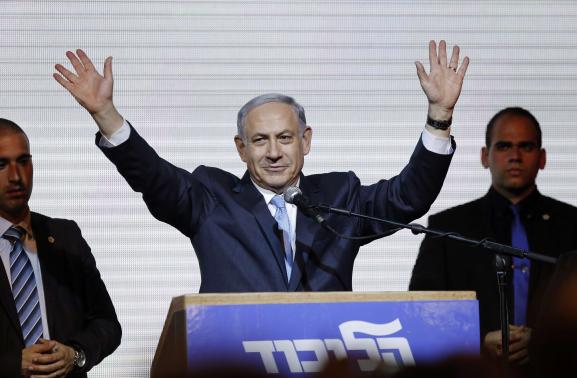 Israeli Prime Minister Benjamin Netanyahu waves to supporters at the party headquarters in Tel Aviv March 18, 2015.[/caption]
Israeli Prime Minister Benjamin Netanyahu waves to supporters at the party headquarters in Tel Aviv March 18, 2015.[/caption]WASHINGTON (AP) -- The Obama administration signaled on Wednesday it could take a tougher stance toward Benjamin Netanyahu following his decisive Israeli election victory and campaign tack to the right, saying there will be consequences for his sudden reversal on the idea of an independent Palestinian state.
While senior American officials said the administration was still evaluating options, they suggested the U.S. could ease its staunch opposition to Palestinians turning to the UN Security Council to create a state.
"There are policy ramifications for what he said," one official said of Netanyahu's campaign rhetoric rejecting the creation of a Palestinian state. "This is a position of record."
If Netanyahu holds firm to his opposition to a two-state resolution to the Mideast conflict, it could force whoever sits in the Oval Office - now and in the next administration - to choose between the prime minister and a longstanding U.S. policy with bipartisan support.
Hours after the Israeli election results were finalized, the White House quickly reaffirmed its support for the idea of two independent nations living side by side, a central tenet of peace negotiations led by presidents from both U.S. political parties. And the White House sharply chastised Netanyahu's party for using anti-Arab rhetoric in the lead-up to the election.
"Rhetoric that seeks to marginalize one segment of their population is deeply concerning and it is divisive," Obama spokesman Josh Earnest said.
Frustrated by both Israel and the U.S., Palestinian Authority President Mahmoud Abbas has become increasingly aggressive in efforts to secure a Palestinian state through other means, including the UN Security Council. The U.S. has veto power on the council and has repeatedly warned Abbas it would block his efforts to use that avenue.
But on Wednesday, a senior administration official said only that the administration was evaluating its options on Security Council action and other possible responses, notably not repeating administration threats to block the Palestinians. A second official confirmed the U.S. could decide not to veto Security Council action.
The officials were not authorized to speak by name about internal deliberations and commented only on condition of anonymity.
Most Republican presidential hopefuls welcomed Netanyahu's victory, but they were notably silent about whether they backed Palestinian statehood. Only Wisconsin Gov. Scott Walker weighed in, saying the U.S. goal "must remain a two-state solution."
Former Republican President George W. Bush made a two-state solution a cornerstone of his efforts to secure peace between Israelis and Palestinians. Obama also has pursued Palestinian statehood, most aggressively in a months-long push for peace that ultimately collapsed last year.
Hillary Rodham Clinton, the Democratic front-runner if she enters the 2016 campaign, did not comment on the Israeli elections. As Obama's first secretary of state, she worked closely with Netanyahu and championed an independent Palestinian state.
Aaron David Miller, a longtime Middle East adviser to secretaries of state from both parties, said it was unlikely a U.S. president of either party would abandon support for Palestinian statehood in the near future.
"I suspect it is the fate of both Democratic and Republican presidents to be caught in a situation in which a two-state solution is too difficult to implement on the one hand and yet too difficult to abandon on the other," said Miller, now a scholar at the Wilson Center in Washington.
Netanyahu announced his support for Palestinian statehood in 2009, shortly after Obama became president. He continued to publicly back that position even as he approved new settlements in East Jerusalem, raising questions about his level of commitment.
Earlier this year, the Palestinians joined the International Criminal Court in pursuit of war crimes charges against Israel. Any decision on a possible investigation is now up to the ICC prosecutor.
Secretary of State John Kerry spoke with Netanyahu Wednesday. The White House said Obama would speak with the prime minister in the coming days.
The Likud Party's decisive victory in Tuesday's elections marked a stunning comeback in a tight race that put Netanyahu in political jeopardy. In the campaign's closing days, Netanyahu abandoned his public commitment to Palestinian statehood.
While the White House publicly avoided taking sides in the election, it was no secret that Obama and his advisers would have welcomed a change in Israeli leadership. Netanyahu is a fierce critic of Obama's nuclear negotiations with Iran, a country Netanyahu says poses a deadly threat to Israel. Netanyahu also deeply angered the White House by accepting a Republican invitation to address Congress earlier this month and make his case against the emerging outlines of an Iran deal.
Netanyahu's shift on Palestinian statehood now seems certain to deepen the rift with Obama. Despite his past assurances to the West, Netanyahu said this week that any talk of Israel withdrawing from lands it seized in 1967 to make room for a Palestinian state is irrelevant because, in his view, Islamic extremists would seize such territory.
Though the prospects of a peace accord in Obama's final 20 months in office were already slim, Netanyahu's stance slammed shut any hope for a breakthrough without a dramatic shift in the region.
"A push now to try to get to the table would run the risk that you produce negotiations that are bound to fail," said Dennis Ross, a former U.S. Middle East envoy. "What you can't afford now is more failure."
By The Associated Press










